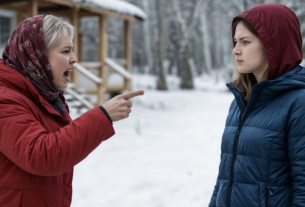Irina straightened the kitchen curtains and looked around her creation with satisfaction. The small rented two-room flat in an old building had been transformed thanks to her efforts. Fresh flowers on the windowsill, handmade cushions on the sofa, neatly arranged knickknacks—all of it turned an ordinary space into a cozy home.
“How beautifully you’ve arranged everything,” Anton smiled, putting his arm around his wife’s shoulders. “Without you this apartment would just be a box with furniture.”
Two years earlier, when the young couple had first rented the place, the walls still held other people’s stories. Irina methodically erased the traces of former tenants, creating an atmosphere of her own. Every detail was thought through—from the color of the curtains to the placement of the paintings.
But most of all, Irina loved to cook. In the tiny kitchen, real magic happened. Pies with golden crusts, fresh salads, tender French-style meat filled the home with aromas, creating a festive mood.
“Where did you get such culinary talent?” Anton would marvel, tasting another of his wife’s dishes.
“Learned from my mother,” Ira would reply, kneading dough. “Cooking is how you show love to your family.”
Even after a hard day at work, she could dream up new recipes with inspiration, just to surprise her husband. For Irina, cooking wasn’t a duty—it was a craft.
Anton was proud of his wife’s talents and often boasted about them to his mother, Lyudmila Petrovna. The older woman gladly came for dinners, sincerely praising Irina’s dishes.
“Son, you’re lucky with your wife,” Lyudmila Petrovna would say over tea. “Such a homemaker, such a cook! The house is tidy and cozy.”
“Thank you, Lyudmila Petrovna,” Irina would blush. “I enjoy cooking for family.”
Gradually, without Irina even noticing, all the family celebrations migrated to their rented apartment. First, Anton’s modest birthday for ten people. Then Lyudmila Petrovna’s name day with relatives. And then New Year’s with all of her son’s family.
“You have such golden hands,” Anton’s aunt marveled. “Where did you find such a perfect little housekeeper?”
The home that had once been a quiet refuge became a place of constant gatherings. Relatives filled the big table, laughing, talking loudly, recalling old stories. And Irina shuttled nonstop between the kitchen and the living room, carrying dishes, changing plates, topping off drinks.
“Irochka, could I have seconds?” Anton’s uncle would ask.
“Of course,” the hostess would smile, even as her legs ached from fatigue.
She rarely managed to sit for even five minutes and share in the joy with the guests. Little by little, Irina began to feel like support staff in her own home.
Nothing terrible seemed to be happening, yet a deep fatigue was growing inside her. Every holiday turned into an ordeal—shopping, cooking, laying the table, cleaning up. The relatives took all the fuss for granted, never even offering to help.
“Why should I get underfoot?” Lyudmila Petrovna would wave off when Irina asked her to help clear the table. “You do everything so deftly!”
The familiar joy of hosting gradually gave way to irritation and the feeling that her work went unnoticed.
One day Irina worked up her courage and tried to talk to her husband.
“Anton, it’s hard for me to turn every holiday into a cooking marathon,” she began carefully. “Maybe sometimes we could meet at a café? Or at least divide up the responsibilities?”
“Why?” her husband was surprised. “Everyone loves your cooking. Mom says she’s never had such delicious pies anywhere.”
“But I get tired,” Irina tried to explain. “Sometimes I just want to be a guest at a celebration.”
“Oh, come on,” Anton waved it off. “You love cooking. And you’re great at it.”
After that conversation Irina felt misunderstood. As if she weren’t seen as the mistress of the house, but as the cook. By spring, exhaustion and irritation had piled up. She cooked no longer with joy, but out of a sense of duty.
When Anton’s sister Svetlana’s birthday approached, Irina knew in advance—it would all land on her shoulders again. She felt weary just thinking of the endless pots and shopping.
“You know what,” Irina said to her husband, “I’m going to take some vacation time. I’ll go visit my parents for a week.”
“Right before Sveta’s birthday?” Anton frowned. “What about the party?”
“There won’t be one,” his wife answered firmly. “You’ll manage without me.”
Irina left for her parents in another city. A week in her childhood home was a breath of fresh air. She felt like a daughter again, not a perpetual housekeeper.
When she returned, she found Lyudmila Petrovna furious.
“How could you!” her mother-in-law flew at her. “You abandoned the family right before the celebration!”
“What happened?” Irina asked calmly.
“What happened?” Lyudmila raged. “We had to order food from a restaurant! We spent money! All because you ran off!”
“I didn’t run off,” Irina replied. “I was resting.”
“Resting!” the older woman snorted. “And who was supposed to cook? Everyone’s used to your dishes!”
Those words were the last straw. For the first time, Irina snapped:
“And why should it be me? Why can’t someone else cook?”
“Because you’re a good cook!” Lyudmila shouted. “It’s your duty!”
“My duty is to be a wife, not a servant!” Irina didn’t back down. “I’m tired of serving everyone! It won’t be like this anymore!”
The quarrel was loud and sharp. After the conflict, Lyudmila stopped coming by. The apartment settled into an unusual quiet that was both frightening and liberating.
A month of peaceful life passed. For the first time in a long while, Irina felt like the mistress of her own home. She cooked for herself and Anton with pleasure. Evenings grew gentler, their conversations calmer.
But deep down she knew—the calm would be broken sooner or later.
One evening, as the spouses sat in the living room with cups of tea, the doorbell shrilled. On the threshold stood Lyudmila Petrovna—confident, collected, a resolute look on her face.
Without waiting to be invited in, the mother-in-law stepped inside and got straight to the point:
“Tomorrow is my jubilee; the guests will come here! You’ll set the tables—there’s room for everyone!” she ordered.
Irina felt a familiar anger boil up in her chest.
“That’s not going to happen,” she answered, restrained but firm.
“What do you mean, not going to happen?” the mother-in-law flared. “I’m used to celebrating here! It’s a family tradition!”
“My home is not a restaurant,” Irina stood her ground. “And I’m not a waitress.”
“You’re obliged to uphold family traditions!” Lyudmila raised her voice. “Ungrateful girl! My son took you in, and you turn up your nose!”
“Anton didn’t ‘take me in,’” Irina replied coolly. “We live together. And we make decisions together.”
The argument erupted right there in the hallway. The mother-in-law demanded and accused, and Irina realized—a decision stood on the threshold, one that would change her life.
“Everything must be perfect!” Lyudmila threw over her shoulder as she left. “So no one thinks our family doesn’t know how to receive guests!”
She left, slamming the door.
That evening Irina tried to talk to Anton.
“I’m not going to throw your mother’s jubilee,” she said.
“Why are you taking it so hard?” her husband brushed it off. “She just wants a celebration. You can put up with it for one day.”
“One day?” Irina looked at her husband. “And then another. And another. When does it end?”
“Well, I don’t know,” Anton shrugged. “She’s my mother. It’s awkward to refuse.”
Those words finally convinced Irina—her fatigue and her boundaries still went unseen.
That night she lay awake for a long time, turning over the last few years in her mind. How life had changed. How she had gone from loving wife to service staff.
In the morning, while Anton slept, Irina got up quietly. She gathered her documents, some money, and a couple of changes of clothes. Her movements were calm and sure, as if the decision had ripened long ago.
She got dressed and, without looking back, walked out of the apartment—leaving behind the noise, the resentments, and the endless parties.
At ten o’clock the phone rang. Her mother-in-law’s name lit up on the screen. Irina answered.
“Where are you?” Lyudmila screeched into the receiver. “How could you do this? Today is my jubilee!”
“Happy jubilee,” Irina replied evenly. “Tell Anton I’m filing for divorce.”
“What?” the mother-in-law asked, stunned.
“I am not a cook and not a maid,” Irina went on. “He can find someone else to service your family.”
She hung up and switched off the phone. She walked down the street toward a new life, feeling not fear but relief—as if she had shrugged off a heavy burden she’d carried for far too long.
Ahead lay an unknown future. But it was her own future, where no one would force her to turn a home into a restaurant or a life into the endless servicing of other people’s whims.
Irina squared her shoulders and smiled. At last, she was free.



